“To Leave Cuba”: The True Spontaneity of Young Students / Miriam Celaya
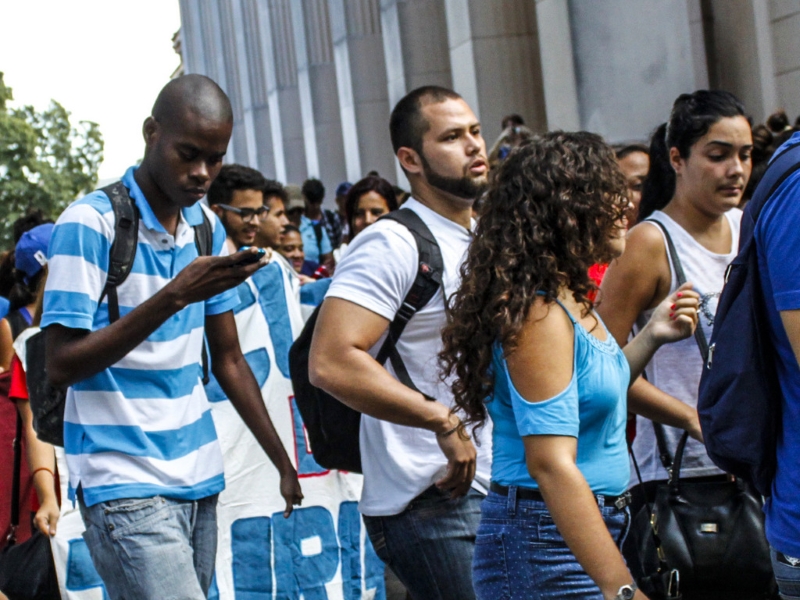
 Cubanet, Miriam Celaya, Havana, 16 February 2021 — Almost a year after the interruption of classes at Cuban universities in March 2020, as an extreme measure to prevent the advance of the coronavirus pandemic in Cuba, the Ministry of Higher Education (MES) issued Resolution 3 of 2021 on January 22. The resolution establishes the “general guidelines for the beginning and development of undergraduate and postgraduate academic activities in the academic year 2021” —which begins February 1— matching “each territory’s epidemiology situation”.
Cubanet, Miriam Celaya, Havana, 16 February 2021 — Almost a year after the interruption of classes at Cuban universities in March 2020, as an extreme measure to prevent the advance of the coronavirus pandemic in Cuba, the Ministry of Higher Education (MES) issued Resolution 3 of 2021 on January 22. The resolution establishes the “general guidelines for the beginning and development of undergraduate and postgraduate academic activities in the academic year 2021” —which begins February 1— matching “each territory’s epidemiology situation”.
Among the provisions of the aforementioned Resolution, the following stands out: prevalence given to the “incorporation of students to the necessary impact tasks, with priority in facing the pandemic …” rather than to teaching activities and the training of future professionals within each specialty.
The document in question insists on what it calls “actions of community impact, as part of the training of comprehensive, competent professionals, with ideological political firmness and committed to the Revolution”, with which the instrument of pressure on young university students is enshrined to use as pawns in the new “battle”, this time against an invisible and potentially lethal enemy, the coronavirus.
Paradoxically, the shutting down of the Universities last March took place, at least in word, to keep students away from possible contagion and control the epidemic, at a time when the number of positive cases was extremely low. For example, official figures for March 23rd, 2020, showed a total of 40 cases since the disease was declared in Cuba (on March 11th), of which 5 were the positive cases detected the day before, and of those cases, only three were Cubans.
Today, however, the situation is much more complex. In one week between Monday, February 8, and Sunday, February 14, 5,458 new positive cases of COVID-19 were reported throughout the country, 2,847 of them in Havana, where the largest portion of the population resides, and where thousands of families live in numerous communities in conditions of poverty and overcrowding.
How, then, is it possible to explain that the current resurgence in cases prevents the start of face-to-face classes in university classrooms, but at the same time require students to join the so-called “impact tasks”, which include support in isolation centers and community polyclinics, investigations into the orderliness of the massive lines outside the markets as part of the famous “Fight Against Coleros* and Hoarders”, with all the risk of contagion that this implies? continue reading
A meeting with several students from Havana’s Enrique José Varona Higher Academic Institute demonstrates what their opinion is on this point and others, contained in Resolution 3/21 of the MES. All of them have been receiving peremptory messages from their “teacher guides” to join the aforementioned “impact tasks”, under warning of being “analyzed” by the Dean’s Office and suffering the corresponding retaliation, which in the most rebellious of cases could include dismissal from the University.
Leannis, a Spanish-Literature Faculty 3rd year student, indicates that the students in her group were instructed to connect to a common “Telegram” thread through which the lead teacher would give them the necessary information about where they should go in the municipality where each resides to receive the corresponding “task”. The municipal institution would also certify their performance.
“There is a high number (of students) who have resisted going, although it is said that they will be paid more than a thousand pesos (CUP), but that money does not warrant the risk. Now a process of analysis of individual attitudes is taking place and there will be sanctions and notes on the student’s record. But there is a lot of disagreement because nobody asked us if we were willing to make that sacrifice… Because it is a sacrifice!”, she reasons.
“To them we are soldiers, so they give us orders as if we were a troop in a war. I’ve already done a year of military service and I don’t have to take orders, even less from a civilian!”, Francis intervenes. He is also in his third year, although in a different faculty, and he is one of those who is reluctant to take on the “impact task”.
Very upset, he shows me a WhatsApp thread on his mobile phone through which his guide teacher and other teachers from the faculty communicate. Threats against those who refuse to “join in the work” are frequent, laying naked young people’s “spontaneity” so much touted by the official media.
“Bear in mind that if you are predisposed, it will be worse… All revolutionary students have joined” (and it is already known that universities are “for revolutionaries”), “be consistent with what concerns you, lamentations will come later.”
“You are not required to attend to give support in these tasks, but everyone knows what is best for you in this case… you have what other countries don’t have, be grateful and you will be able to attain your career… the impact tasks will be measured and evaluated as one more subject… let’s call ourselves a chapter, don’t take this as a scolding, or a much less as a threat” …are some of the messages from teachers to young people that can be read in the thread.
“They also told us that we should donate blood,” adds Vanessa, a 3rd year Spanish student. “I don’t know how they say in the government media that ‘everything is guaranteed’ and now they ask us for blood because ‘there is a national emergency…’ There are many things that are not understood, they are not being clear and they are not telling us everything… I’m even afraid”.
Two other fellow members are more withdrawn, afraid to express themselves, but end up being infected by their peers. “What worries me the most is that last year ended with practical work in some subjects and in others with a ‘shutting down for performance’, which was in consideration for the teachers, without debate or consultation. They sent us a note, period. We finished 2nd year without completing the course syllabus and continue the same or worse”, says Igor, in his 3rd year of the Art Faculty.
“I want to be a good teacher”, Leannis intervenes, “but we all come with a very bad base due to the low level of education we had in elementary, secondary and high school. Now it is worse, because in that Resolution it is said that we must develop ‘self-management of knowledge’, ‘autonomous learning’ and other things that can only be done when we have a bibliography, Internet access, digital content and other guarantees that most Cuban students do not have. Everything looks very nice in the document but in real life we know that only those who have families with resources can learn and take proficiency tests because they can buy cards to connect to the Internet, download information and get bibliographies. The rest of us have only a study guide and a list of sources, but no books or megabytes. I feel very frustrated”.
Once again, as is often the case with everything legislated in Cuba, the aforementioned Resolution is no more than another manifesto of intentions, the kind written by a group of satisfied technocrats with the sole purpose of showing public opinion how concerned the political power is about the new generations’ education which, in truth, has no relation to the vital reality of these young people and the majority of Cubans.
Meanwhile, frustration and uncertainty are the feelings that predominate in my interviewees. They do not have the solution; they feel that they are wasting their time and know in advance that they are condemned to the same mediocrity that ended up swallowing their parents’ and grandparents’ generations. That is why, when I asked them the last and provocative question: “what, then, is your best expectation in this scenario?” I was not surprised by an answer as heartbreaking as it was firm and unanimous: “For us to leave Cuba, the sooner the better”.
*Translator’s note: Coleros are people who are paid by others to stand in line for them (as it is not unusual for lines to be hours long, or even days).
Translated by Norma Whiting
Some 40 Mexican Doctors Who Don’t Want to Go to Cuba Request Protection Under a Writ of Amparo
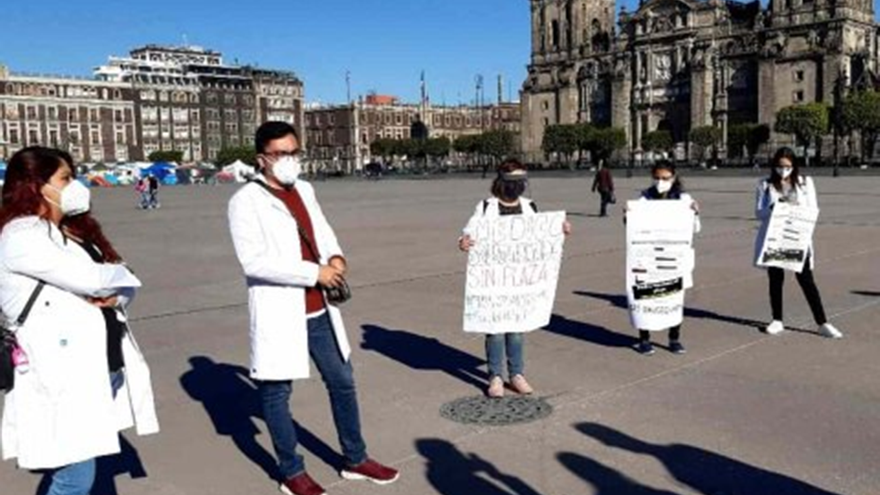
![]() 14ymedio, Lorey Saman, Mexico, February 18, 2021 — Around 40 Mexican doctors have come together to file amparo lawsuits for protection from being forced to study their specialty in Cuba by the Government of Andrés Manuel López Obrador.
14ymedio, Lorey Saman, Mexico, February 18, 2021 — Around 40 Mexican doctors have come together to file amparo lawsuits for protection from being forced to study their specialty in Cuba by the Government of Andrés Manuel López Obrador.
The writ of amparo—a legal instrument that exists in Mexico to protect citizens from possible arbitrariness by the State—is based on alleged violations in the selection process, which they agreed to after passing the National Examination of Applicants for Medical Residency (ENARM) last November.
“In Mexico, any act of authority must be duly founded and motivated, and if it had been established in the call for applicants that the only place of destination was Cuba, there would be no problem,” the lawyer Miguel Ángel Rodríguez, representing to the plaintiffs in Mexico City, explains to 14ymedio. “The point is that the doctors took the exam, but they weren’t told that it was to study in only one country.” continue reading
López Obrador announced in May last year that they would create a program of specialty scholarships abroad for doctors due to the lack of places in Mexico. In November, the health authorities reported not only the doubling of places but also the launch of up to 1,600 scholarships abroad, destined for Canada, the United States, Argentina, Cuba and Australia, under the National Council for Science and Technology of Mexico (CONACYT).
It should be noted that in these countries, access to medical residency for foreigners involves strict immigration requirements as well as qualification by a demanding specialty exam, something which the Mexican Government did not mention at any time when announcing the creation of the scholarships.
When CONACYT published the requirements to fill 1,000 places with scholarships on December 15, the students who had already received their ENARM diplomas discovered that the only destination available to them was Cuba.
The Undersecretary of Health Hugo López-Gatell— the visible face of the Government during the Covid pandemic—told the protesters that they “are free” to not go to the Island, but in this case they will have to repeat the exam in the next call.
In this regard, the lawyer recalled that the Inter-American Court of Human Rights ensures the rights of people during the pandemic, and that the document asks governments and their leaders to be ethical and clear in their pronouncements. The official’s position, Rodríguez says, was added as evidence in the last lawsuit.
“There were only four locations authorized in Mexico where you could take the exam, and doctors from all over the Republic had to travel to these places. Many of them had to borrow money to do so. They didn’t know that they would have only one option for being placed, and this is something that López-Gatell didn’t consider. He is not taking into account the effort put in by the doctors who participated and won a place in the quota,” the lawyer points out.
“The rules weren’t clear, which is either an inconvenient mistake or a purposeful violation, and that is what we are contesting by way of a writ of amparo,” insists Rodríguez, a member of the Lex Artis Medica, a medical law group.
“Changing these circumstances is detrimental to the rights of resident doctors, who have earned a place in Mexico’s academic system,” he explains. “We want the judge to order the authority to respect the doctors’ rights, since they passed the exam.”
According to the lawyer, the doctors are aware that the Mexican health system can’t take on so many residents, and in the event that the State alleges that there are no places to send applicants, the lawsuit also requests that the quota they’ve already obtained serve them for the following year.
“This is not a problem generated by the doctors; it’s a problem that the State itself created by increasing the number of places, and by the Mexican health system for not having the capacity to accept them,” he asserts.
The lawyer also considers it extremely serious that the Cuban Medical Services Marketing Company prohibits postgraduate studies for HIV carriers and pregnant women. “The State should put an end to these discriminatory barriers and gender-based violence and it hasn’t done so, nor has it issued one single statement of agreement to improve these circumstances,” Rodríguez denounces. “In no way are we asking the Court to issue a recommendation to another country, but it can tell the Government to revise those parts of the agreement between Mexico and Cuba.”
The process began with the lawsuit filed last January by 12 doctors, which was joined at the beginning of February by another group. Little by little, Rodríguez assures, more doctors are being added: “They can either lose their place and retake the exam or join the lawsuit.”
The Covid-19 pandemic has slowed down the process due to the suspension of activities in the courts, but this week the doctors were informed that the lawsuits are already being reviewed. “At any moment we will have a resolution; either they will support the claims or they will ask us to clarify some point for the judge; in the worst case, they will dismiss the lawsuits.”
In March the doctors are supposed to begin residency in their specialties, but the processing of the protection orders could postpone their studies.
Translated by Regina Anavy
____________
COLLABORATE WITH OUR WORK: The 14ymedio team is committed to practicing serious journalism that reflects Cuba’s reality in all its depth. Thank you for joining us on this long journey. We invite you to continue supporting us by becoming a member of 14ymedio now. Together we can continue transforming journalism in Cuba.
‘They Are Going to Demolish My Little House With Me Inside’
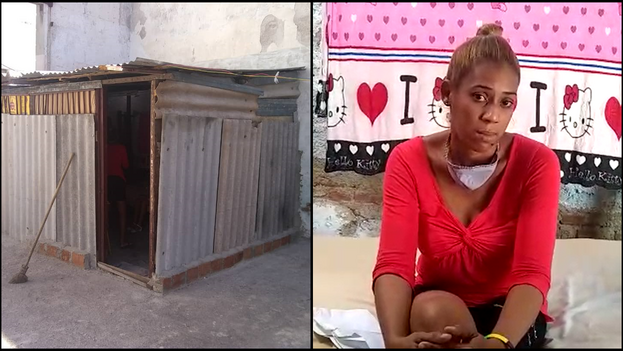
![]() 14ymedio, Francisco Herodes Díaz Echemendía, Santiago de Cuba, 16 February, 2021 — Yaneysi Dupuy Zamora had been sleeping in the living room of her grandmother’s house for 13 years with her 10-year-old daughter. Two months ago she decided, with the few materials she could find, to build a small house on land abandoned by the State on Bartolomé Masón Street (San Basilio), on the corner of Peralejo, in the center of Santiago de Cuba.
14ymedio, Francisco Herodes Díaz Echemendía, Santiago de Cuba, 16 February, 2021 — Yaneysi Dupuy Zamora had been sleeping in the living room of her grandmother’s house for 13 years with her 10-year-old daughter. Two months ago she decided, with the few materials she could find, to build a small house on land abandoned by the State on Bartolomé Masón Street (San Basilio), on the corner of Peralejo, in the center of Santiago de Cuba.
There, in a vacant lot without a roof that in the past was a building for state use but of which only the façade remains, other families settled down to build nine small houses with materials collected from the streets.
“This space was empty, there was almost nothing, only garbage and three recently built wooden houses. I approached one of the neighbors and asked her if I could build something of my own in a corner,” she tells 14ymedio. Dupuy, 38, had submitted several requests to get access to a state parcel, but never received a response. continue reading
A few days ago, they received a visit from the inspectors of the Physical Planning Institute to inform them that they could not stay in the premises and they were given a notice that the State would demolish the houses within 72 hours. “I don’t have a bathroom, I don’t have anything, but even so, in this little piece, when I close my door, I can even rest,” says Dupuy. “For more than a week I have been without peace.”
Cuban legislation considers an “illegal occupant” to be anyone who has built or occupies “a dwelling built on land that is known to be owned by another person who has not allowed said building, or on state land without any authorization.” Penalties include fines, home demolition, and eviction.
Shortly after the first visit, another inspector fined each family 500 pesos. “He did not look at the conditions in which I am living with a little girl, that I don’t even have money to eat and how I am going to pay a fine of 500 pesos. I cannot tear this down, because where am I going to sleep with my daughter?”
The inspector returned three days later and sanctioned them with another fine of 1,000 pesos and warned them that he would later give them another of 1,500. “I don’t even know his name because he didn’t even have his identification,” says Dupuy, “but he threatened me in front of my daughter: ’Too bad your tiles are very nice because we’re going to destroy them’, that’s what he told me.” To which she replied: “Well, you will demolish it with me inside. I will close the door of my little house with my girl inside.”
The illegal residents allege that the land was abandoned, turned into a garbage dump that they have been cleaning little by little, in the middle of a city with serious housing problems. “This was immoral, while there are so many homeless people in Santiago,” another of the occupants of the vacant lot told 14ymedio .
Previously, the place was a large warehouse linked to private commerce that was nationalized in the 1960s. In 2012 the winds of Hurricane Sandy demolished the roof of the property and, after a few years, kiosks were placed inside it for the sale of beer and soda in bulk. Thus, it came to be filled with waste to the annoyance of the residents of the area who complained of rats and bad smells.
“Do you think this has the optimal conditions for a human being to live? No,” says Dupuy, who is a professor at the Provincial School of Arts. “Only those who need it, and yet we try to live because we have nowhere.”
“Do you think this has the optimal conditions for a human being to live? No,” says Dupuy, who is a teacher at the Provincial School of Arts. “Only those who need it, and yet we try to live because we have nowhere.”
According to official data, the housing deficit in Cuba reached 929,695 houses last year. Among the most affected provinces are Havana, with a shortage of 185,348 homes; Holguín, with 115,965, and Santiago de Cuba, with 101,202.
____________
COLLABORATE WITH OUR WORK: The 14ymedio team is committed to practicing serious journalism that reflects Cuba’s reality in all its depth. Thank you for joining us on this long journey. We invite you to continue supporting us by becoming a member of 14ymedio now. Together we can continue transforming journalism in Cuba.
The Cuban Regime and its Propaganda Apparatus Prefer Death to Life
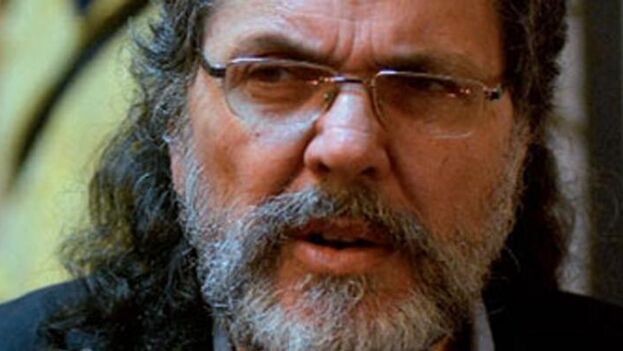
![]() 14ymedio, Havana, 18 February 2021 — Covid-19 offers no truce — 923 cases and 5 deaths in the last report — but Cuban authorities seemed more concerned this Thursday about the surprising success of the video clip Patria y vida, which has gone viral on social networks. All the official media, starting with Granma, the daily of the Communist Party, dedicate several articles to denigrating the authors.
14ymedio, Havana, 18 February 2021 — Covid-19 offers no truce — 923 cases and 5 deaths in the last report — but Cuban authorities seemed more concerned this Thursday about the surprising success of the video clip Patria y vida, which has gone viral on social networks. All the official media, starting with Granma, the daily of the Communist Party, dedicate several articles to denigrating the authors.
“Cuba will not renounce the slogan ‘homeland or death’, a declaration of principles of the historic leader of the Revolution, Fidel Castro,” said Abel Prieto, former Minister of Culture and president of the Casa de las Américas, according to the Prensa agency. Latin.
Even the president of the Provincial Defense Council of Havana, Luis Antonio Torres Iríbar, spoke about it in his daily meeting. After highlighting the effort “of the medical and paramedical personnel, various specialists, experts, the Police and the people in this contest, in which Cuba makes a difference with the rest of the world, due to the way it faces the pandemic,” the official insisted that “many people today repudiate counterrevolutionary songs on social networks created by artists who sold their souls to the empire and live under it. continue reading
Torres Iríbar called for “continues fighting against enemies, under the slogan of ‘homeland or death’ and the conviction that we will win, because the only way to win is by fighting,” the official press reports.
According to testimonies collected by 14ymedio, the authorities are calling for figures of the national culture to record a video singing the notes of the national anthem and conclude the song with the official slogan “homeland or death,” proclaimed for the first time by Fidel Castro in 1960.
“We are making a call that starting today at nine o’clock at night, in addition to the applause to support our doctors, we want our heroic anthem and the phrase ’homeland or death’ to be heard,” a Communist Party militant said this Thursday morning at an emergency meeting with retirees from a neighborhood in Havana’s Plaza municipality.
“We are not going stand by, because we have the last word,” said the pensioner in front of a dozen militants over 65 years old.
In the midst of the worrying panorama of the pandemic, the authorities, who in recent days had expressed certain self-criticism, acknowledging failures in the detection of the virus and calling for greater observance of health standards in institutions and work centers, have taken up the triumphalist tone to attack the song composed by Gente de Zona, Descemer Bueno, Yotuel Romero, Maykel Castillo Osorbo and El Funky,
Despite the strict measures, which include the confinement of the neighborhood with the highest incidence and the night curfew, the capital remains at the forefront of infections. Santiago de Cuba, which the previous day had a lower figure, returned to second place, with 117 cases.
Among the positives of the day, only a minority, 36, were imported. The accumulated number of positives since the pandemic began, in March last year, amounts to 41,688, and the number of deaths has risen to 282.
____________
COLLABORATE WITH OUR WORK: The 14ymedio team is committed to practicing serious journalism that reflects Cuba’s reality in all its depth. Thank you for joining us on this long journey. We invite you to continue supporting us by becoming a member of 14ymedio now. Together we can continue transforming journalism in Cuba.
‘Patria y Vida’, a Soundtrack for Change in Cuba
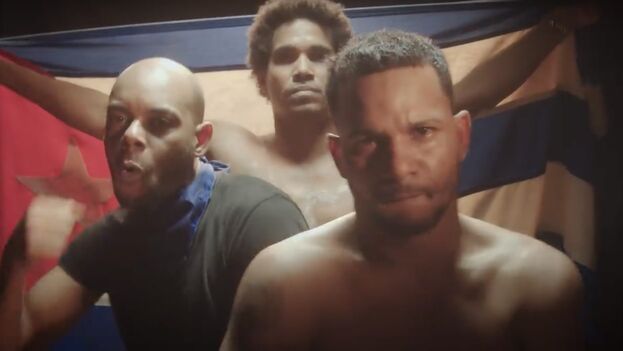
![]() 14ymedio, Havana, 17 February 2021 — The video was released on social networks on Tuesday night and just twelve hours later it already exceeded 200,000 views on YouTube. No one expected anything less: for the first time Gente de Zona, Yotuel Romero and Descemer Bueno, residents outside of Cuba, work in a collaboration with the musicians Maykel Castillo Osorbo and El Funky, on the island. Together, they turn the most necrophiliac motto of the Revolution and create a rebellious song: Patria y Vida (Homeland and Life).
14ymedio, Havana, 17 February 2021 — The video was released on social networks on Tuesday night and just twelve hours later it already exceeded 200,000 views on YouTube. No one expected anything less: for the first time Gente de Zona, Yotuel Romero and Descemer Bueno, residents outside of Cuba, work in a collaboration with the musicians Maykel Castillo Osorbo and El Funky, on the island. Together, they turn the most necrophiliac motto of the Revolution and create a rebellious song: Patria y Vida (Homeland and Life).
The theme is, mainly, a tribute to the San Isidro Movement (MSI) and the protests it has triggered.
The artist Luis Manuel Otero Alcántara, leader of the MSI, who appears with Osorbo in the video hugging a Cuban flag, declares to 14ymedio that the most important thing about “this action” is “to draw attention to society, the Blacks of the San Isidro neighborhood, the Blacks of the Cerro neighborhood, those who stand in endless lines.” In his opinion, the video clip “helps to create that project of a country where these people feel identified, included.”
“They broke down our door, violated our temple and the world is aware that the San Isidro Movement continues to be in place,” says one of the verses of the song, in reference to the eviction that MSI suffered on November 26, after more than one week on hunger strike for the imprisonment of rapper Denis Solís, which was the trigger for the peaceful protest on November 27 in front of the Ministry of Culture. continue reading
The audiovisual, directed by the Cuban director Asiel Babastro, collects several moments of the repression that Cuban artists have suffered in recent months, both in acts of repudiation and in arbitrary arrests. It also includes, for example, a fragment of the protest carried out on Calle San Rafael by Luis Robles, who today is serving prison for the crime of “acts against the security of the State.”
Note: The version of the video above is subtitled in English. The version below offers the options of choosing subtitles and seeing the lyrics in the original Spanish.
In addition, the theme denounces the precarious economic situation of the country. “What do we celebrate, if people are quickly exchanging Che Guevara and Martí for hard currency?” Sing the reggaeton players, alluding to the recent monetary reform and the creation by the Government of foreign currency stores to which most Cubans do not have access.
“No more lies, my people ask for freedom, no more doctrines. Let us no longer shout homeland or death but homeland and life,” Alexander Delgado, from Gente de Zona, is heard saying at another point in the song, which has raised a wave of support on the internet with the hashtag #PatriayVida.
In the live online presentation, the musicians sent a message of solidarity to the artist Luis Manuel Otero Alcántara, El Funky and Osorbo. They managed to establish contact with them, but very briefly because communication was cut off.
For Yotuel Romero, Patria y vida is “a song to freedom, a song to life, a song to love for our land, for our Cuba.”
“We cried making the song, making the video,” confesses Romero. “I want you to listen to the song, internalize it and say along with us: it’s over, the lie is over, the deception is over, the torture is over, the incarceration is over, the prison is over, not letting you be you is over.”
Descemer Bueno, for his part, claims to be “super happy to be making history” because for him this issue “marks a before and after” for the generations that follow. “People are already realizing what is happening and are feeling firsthand what the end of this dictatorship is going to be,” he predicts.
With a career full of successes in Cuba in the video clip universe, Asiel Babastro considers this work as “the icebreaker,”,by including artists censored in Cuba and having a rebellious discourse. The director said that it was a “tremendous responsibility” for him “to bring together these people who have been around the world.” The director also speaks of the importance of connecting “with the message of the song, with people who are doing real things to have the right to have rights.”
“I have always believed that a government that tells lies does not deserve to be there, I believe that the truth is for everyone, there is no need to go further, the video talks about that, it shows with the honesty of these artists, their speech, we want to have the right to think differently, to see a change,” he asserts.
The regime has not been long in replying to the viral video clip, in an article that, in line with the campaign carried out by the state media against the San Isidro Movement and the 27N, it tries to denigrate the authors of the song by calling them “moochers.”
____________
COLLABORATE WITH OUR WORK: The 14ymedio team is committed to practicing serious journalism that reflects Cuba’s reality in all its depth. Thank you for joining us on this long journey. We invite you to continue supporting us by becoming a member of 14ymedio now. Together we can continue transforming journalism in Cuba.
Cuban Government Must Normalize Relations With Cubans Before Doing So With The U.S.
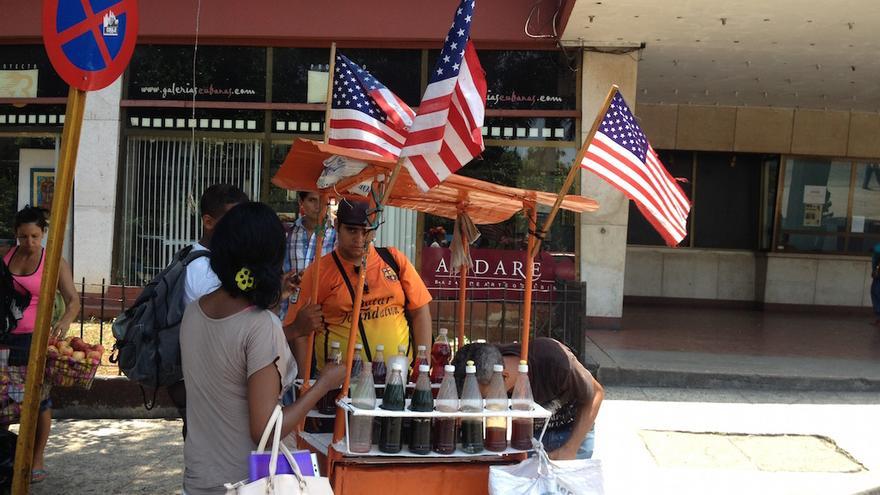
![]() 14ymedio, Havana, February 15, 2021– Cuban citizens residing inside and outside the Island have published a letter asking the U.S. Government not to normalize relations with Cuba as long as the Cuban Government hasn’t normalized relations with its own citizens. The text is also addressed to the Cuban Government and the U.S. Congress.
14ymedio, Havana, February 15, 2021– Cuban citizens residing inside and outside the Island have published a letter asking the U.S. Government not to normalize relations with Cuba as long as the Cuban Government hasn’t normalized relations with its own citizens. The text is also addressed to the Cuban Government and the U.S. Congress.
The signers say that they were disillusioned with the thaw between the U.S. and Cuba that began during the presidency of Barack Obama in 2014. They learned something from the frustration of that moment, and their petition is based on these lessons.
“During normalization, there were no advances in human rights on the Island. National and international organizations documented high levels of repression against civil society and opponents of the Regime. Many activists, journalists, entrepreneurs, and artists who supported normalization have since gone into exile,” they emphasize. continue reading
The petitioners consider that totalitarianism is inherent to the Regime, and they point out that since Joe Biden was elected President of the U.S., and especially since he took office, the arrests and harassment of several people from civil society have increased.
In addition to alluding to the repressive nature of the Cuban authorities, they refer to problems related to the economic system, which weren’t resolved in the previous reestablishment of relations and, on the contrary, deepened the inequalities. “During the previous thaw, it’s true that a certain urban middle class grew that maintained an attitude of non-confrontation or collaboration with the Regime, but the impoverished majority of the country didn’t benefit.”
In the text, the activists declare themselves committed to the democratic advancement of Cuba and support a new negotiation between the governments of Havana and Washington, but with six conditions, which are, in their opinion, “minimal and indispensable.”
First, they call for diverse groups in civil society to actively participate in the normalization process. In addition, they request that the negotiations be transparent and that what is addressed in the meetings be made known to citizens of both countries and disseminated by the press, without a distinction between the official and the independent press, in the case of Cuba.
“The process should be accompanied by mediators of credibility and experience such as the Vatican, Norway, and the European Parliament, and it should multilaterally involve governments and civil society in Europe and Latin America,” they claim.
The third condition is that there be official recognition of the “civil, economic and political” rights for Cubans, and that the Cuban Government ratify the international agreements on human rights.
They also demand that the human rights agreements have specific goals that can be evaluated and supervised by other governments, and that the process of normalization be discontinued in the case of violations.
The immediate release of political prisoners and the legalization of civil and political organizations should be, they assert, the first requirement, without which no negotiating process should be initiated.
With regard more specifically to the U.S. Government, the document also calls for the restrictions on travel and the sending of remittances “by civil means” as well as through consular procedures to be repealed.
Meanwhile, the Cuban side must eliminate “the prohibitions from leaving and entering the country for doctors, athletes, professionals, dissidents, activists, and all people who are unjustly deprived of these rights.”
“Let Cuba insert itself in the world as a truly sovereign country, respectful of human rights and democratic, something that today is far from being a reality. All negotiations must be focused on this objective,” concludes the text, signed by more than 300 Cubans from inside and outside the Island, among whom are Luis Manuel Otero Alcántara, Anamely Ramos, Maykel Castillo Osorbo, Camila Lobón, Héctor Luis Valdés Cocho, Henry Constantín, Carlos A. Aguilera, Armando Chaguaceda, Orlando Luis Pardo Lazo , Rosa María Payá, Eliécer Ávila, and Rafael Rojas.
The letter comes a week after another letter addressed to U.S. President Joe Biden requesting the restoration of dialogue and normalization of relations between the two countries. In that case, the petitioners were around more than 300 scientists, intellectuals, artists and entrepreneurs, who said that the Cubans expect the President to “take the first step and unconditionally lift the sanctions imposed on Cuba.”
Translated by Regina Anavy
____________
COLLABORATE WITH OUR WORK: The 14ymedio team is committed to practicing serious journalism that reflects Cuba’s reality in all its depth. Thank you for joining us on this long journey. We invite you to continue supporting us by becoming a member of 14ymedio now. Together we can continue transforming journalism in Cuba.
For Washington, Cuba is Not a Priority / Ivan Garcia
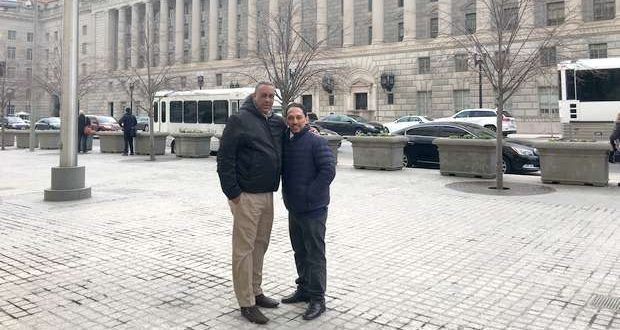
Iván García, 15 February 2021 — As he drives a ramshackle Soviet-era Moskvitch down a central avenue west of Havana, Samuel, a retired athlete, explains why doing business in Cuba is very difficult. Eleven years ago, when Raúl Castro kicked off the expansion of private work, Samuel used the money he saved plus a loan from his New York-based brother to buy two Willys jeeps manufactured in the 1950s, but updated with modern engineering.
With his earnings from deploying those jeeps as collective taxis, Samuel acquired a brand-new 1958 Impala convertible that he would rent to the tide of North American tourists, who – seduced by the reestablishment of diplomatic relations and the free marketing provided by the generous Obama Doctrine – rolled in on planes and cruise ships to get to know the communist Island of the Caribbean. Samuel had a fleet of two jeeps and two cars and was planning to buy a truck, recondition it, and use it for interprovincial transportation. But he never had legal backing.
“That is the main problem with opening a business in Cuba. There is no agreement or deal, a notarized document spelling out your rights and duties. All that happens is the State one day will tell you that it is authorizing this or that business (which usually was already operating illegally) and then it imposes a severe tax on you and too many controls. You can’t count on a wholesale market, and with every passing year – with no justification – your taxes go up and the inspectors make your life impossible,” Samuel asserts, and adds this: continue reading
“Because of certain circumstances, the government has been forced to authorize private work. This has never been to promote free enterprise, so that the most talented will prosper and generate wealth. No. It has always been a concession by the State, forced upon them by their inefficiency or, like now, because they are trapped in an economic crisis and they will let you run certain businesses – but always while pointing the finger at you and not allowing you to gain too many profits.”
Six out of nine entrepreneurs interviewed agree that self-employment is not usually to the liking of the regime’s apparatchiks. “It is a necessary evil that allows the State to reverse the economic depression and attract the half million state workers who between 2010 and 2012 lost their jobs. But, ideologically speaking, we are out of context. We are annoying. The usual suspects who engage in speculation, tax evasion, and personal enrichment. They see us as potential criminals or dissidents of the system, “says Geovany, owner of a body shop, a business that for many years has been in legal limbo.
Manuel, an economist, believes that if a society is committed to the progress of the country and the creativity of its people, then “private work should not be a problem. It is desirable for taxes to be as low as possible so that those business that are the genesis of future small and medium-size enterprises, and even of large companies, can flourish. Under Cuba’s circumstances, it would be very difficult for Bill Gates, Steve Jobs or Jeff Bezos to become what they are today. They would not have passed the startup-in-a-garage stage. And if they had made a lot of money, they would have been accused of illicit enrichment or embezzlement.”
Onilio, a software programmer, prefers to give the regime a chance. Just one more. “I would like to believe that, this time, the announced opening of more than two thousand private jobs will unleash the creativity of Cubans. I intend to set up an electronic payment gateway for food, clothing and household appliances. But for that to work, the government must authorize imports. Either legalize the “mules” – or else make it so that we private entrepreneurs can purchase goods abroad on our own. If the level of importation is too high, then call upon the State-run import companies to manage it. We should have wide autonomy. And bet on ventures that have added value. Not just services.”
At the moment, the regime maintains some restrictions that prevent free importation. An entrepreneur who met with US President Obama during his visit to Havana in March 2016 is skeptical of the current Cuban government strategy.
“I hope I’m wrong and the authorities this time are serious and don’t put the brakes on private work. But the evidence and history make me pessimistic. I remember that as soon as I left the meeting with Obama, the ONAT (National Tax Administration Office) officials began to inspect my business. If there is no structure where to acquire raw materials, free import and export or doing business with foreign entrepreneurs is impeded, it is very difficult for businesses to be transparent. It is the regime itself, by not creating a specific legal framework and by imposing high taxes, which caused the self-employment sector to be distorted. To change things, the government must change its mentality.”
Ramiro, an analyst, considers that the expansion of private work as more a political strategy to seduce the current White House administration than a project to involve private entrepreneurs in Cuba’s economic future. “Too many coincidences. Recently, the government informed the president of Colombia of alleged terrorist plans by the ELN (Army of National Liberation), most members of which reside in Cuba.
What is the real intention here? To distance themselves from the Colombian terrorists? The Cuban government will probably leave the ELN to its own devices, sacrifice it in its attempt to negotiate with Washington. But I am left wondering if the efficient Cuban intelligence services did not know in advance of the attack on a police cadet school in Bogotá in January 2019. It is clear that this move is a message to Biden: that Cuba is willing to negotiate on any topic. It would be necessary to see if they do not sacrifice a bigger piece, such as [Nicolás] Maduro [the contested president of Venezuela]”, the analyst emphasizes and adds:
“Internally, regime leaders know that the White House’s policy guidelines favor relations with the private sector and dissidents. They yield on the issue of the private sector, hence the bait is tossed to expand self-employment, so as to continue repressing the opposition. The government knows it is racing against the clock. The historical figures of the revolutionary process will cease being valid interlocutors within a couple of years, since they are already of retirement age and close to death. It is the new breed of leaders, in my opinion, which must draw up a functional economic policy and a consequent foreign policy. The White House knows this. And within Cuba some things are no longer the same. As a result of the ‘tarea ordenamiento‘* – a strategy about which the people were not consulted – discontent, controversy and criticism from the population have changed the correlation of forces,” and he concludes:
“More and more citizens and sectors are betting on dialogue, transparency and democracy. This segment of civil society is not even dissident – something that has caught the government – which is aiming its media cannons at the opposition – by surprise, being that it is a vast majority of Cubans who seek to dialogue with the regime about the future of Cuba. And not for the regime to negotiate on its own with the United States.
On February 9, a bipartisan resolution presented in the United States Senate by Democratic legislators Bob Menéndez, Richard Durbin and Ben Cardin, and Republican Marco Rubio, expressed solidarity with members of the San Isidro Movement and requested the Cuban authorities to initiate a dialogue process with independent artists. The text also demanded the release of rapper Denis Solís, the cessation of repression against Cuban artists and the immediate repeal of decrees 349 and 370 as well as the other laws and regulations that violate freedom of expression in Cuba.
Local political operatives will choose to negotiate directly with Washington, trying to avoid a national dialogue. They believe that it is possible to return to the honeymoon period that lasted between 2014 and 2016, when the flags of the stars and stripes waved on the balconies and old collective taxis. A rupture that provoked the dictatorship itself, especially after Obama’s historic speech in Havana.
The bulk of the measures approved by the White House at that time benefited the private sector and the Cuban people, not the military companies. But this time the game board is different. The Island is caught in an extensive economic and social crisis. And on Biden’s agenda, Cuba is not a priority.
*Translator’s note: Tarea ordenamiento = the [so-called] ‘Ordering Task’ which is a collection of measures that includes eliminating the Cuban Convertible Peso (CUC), leaving the Cuban peso as the only national currency, raising prices, raising salaries (but not as much as prices), opening stores that take payment only in hard currency which must be in the form of specially issued pre-paid debit cards, and others.
Two Ways to Get Rid of CUCs in Cuba: Line Up at the Bank or Give Tips
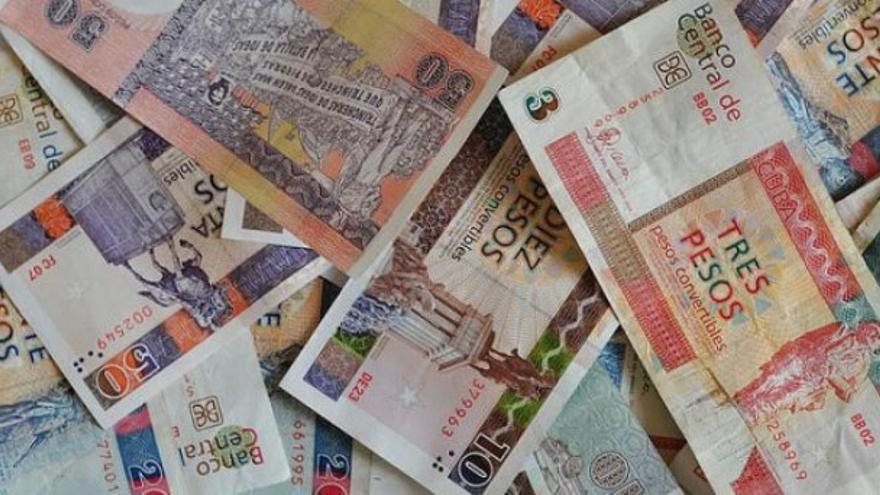
![]() Vice President Marino Murillo celebrated on the Roundtable TV program on State TV that Cubans have already disposed of half of the 600 or 700 million CUC that are expected to be put out of circulation between January 1 and June 30 of this year.
Vice President Marino Murillo celebrated on the Roundtable TV program on State TV that Cubans have already disposed of half of the 600 or 700 million CUC that are expected to be put out of circulation between January 1 and June 30 of this year.
“We designed that the CUC was going to be alive for six months, that it would be changed at the bank and collected in a group of commercial entities. What is happening is that the information was not good and it did not say exactly where it is collected and where it is not, acknowledged the person in charge of the “Ordering Task,” which includes monetary unification and the disappearance of the convertible peso (CUC). “This lets people know exactly how fast they have to get rid of their CUCs.”
Murillo also warned that between now and the 180-day period expires, the number of establishments that accept CUC, all state-owned, could decrease. On January 12, the authorities had announced that a total of 500 businesses would accept the currency, including those of the Caracol chain, the Palmares Extra-hotel Company and the Artistic and Literary Promotions Agency (Artex), in addition to the Cimex and Caribbean chains. continue reading
Getting rid of the CUCs remains, in short, very difficult. Most of the private businesses and services no longer accept the currency which, until a few months ago, was the most precious of the two kinds of pesos that circulated in Cuba. Food service menus and offerings from the self-employed sector have been mostly updated and are now show prices only in CUP or directly in dollars, as the reference currency.
In these establishments, there is still a way to get rid of the convertible pesos. “I have been tipped more in recent weeks than in half a year,” jokes a pizza delivery man from home. He works with the Mandao courier service in the Cuban capital. “People want to get rid of the CUC coins and give them to me so that it is my problem.”
This “problem” is, fundamentally, the lines at the bank to change the CUC. These have not abated since the beginning of the year. Customers who are waiting to get Cuban pesos, are joined by those interested in opening an account in freely convertible currency (MLC) to be able to buy in foreign currency stores, and by those who seek to pay any paperwork or overdue debt with the National Tax Administration Office, as well as those who have come to the bank to collect a transfer from abroad.
“Where’s the end of the line?” repeats a customer outside a bank on Ayestarán Street, in Havana. “If you come to change CUC you have to stand in this line because the other is for those who come to do other operations,” warns another user who is waiting outside the branch.
“I have tried to pay with these chavitos but nobody accepts them, so today I am not leaving here until I can get rid of them,” says the customer who arrived more than three hours ago to exchange 25 CUC, in two bills, one with the image of a sculpture by Camilo Cienfuegos and the other with the equestrian statue of Antonio Maceo. Convertible pesos, unlike their cousins the Cuban pesos, do not have the faces of heroes but monuments.
“They never showed their faces,” jokes a young woman who also hopes to “liquidate the few” CUC that she has not been able to spend. “I kept two bills, the one for one peso and the other for three because I want to keep them to remember what they looked like,” she says. “It is not that I collect anything, it is that since I was born this was the money that was needed to buy what was really worthwhile and now it is not. It is like saying goodbye to a relative.”
____________
COLLABORATE WITH OUR WORK: The 14ymedio team is committed to practicing serious journalism that reflects Cuba’s reality in all its depth. Thank you for joining us on this long journey. We invite you to continue supporting us by becoming a member of 14ymedio now. Together we can continue transforming journalism in Cuba.
Cuba’s Minister of Culture Alpidio Alonso and Me
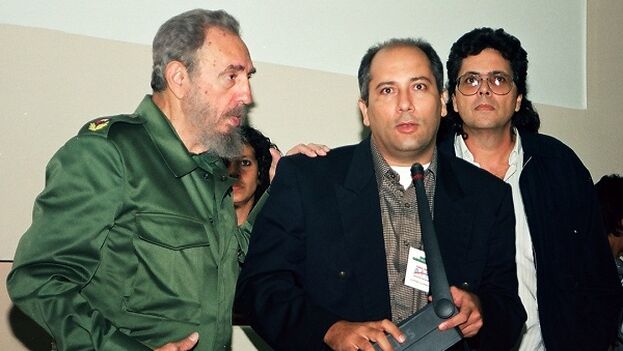
![]() 14ymedio, Yamil Simón-Manso, Gaithersburg (Maryland) | 13 February 2021 — Cuban artists and intellectuals recently staged a protest in front of the Ministry of Culture. The diversity of writings on the Internet referring to the same thing renders any analysis redundant, and we Cubans are up to here in redundancies. In addition, I have not visited Cuba for a long time and although Gardel’s song repeats that “twenty years is nothing,” for me, twenty years is an eternity. In terms of human development, Cuba seems to be stranded where I left off in 1994, particularly in terms of a lack of tolerance for dissent and diversity, as evidenced by events following the protest and the involvement of the Minister of Culture. But I don’t particularly want to write about that either. That’s obvious. Instead, I want to tell a story; the anecdotal is always more interesting and revealing than any academic writing.
14ymedio, Yamil Simón-Manso, Gaithersburg (Maryland) | 13 February 2021 — Cuban artists and intellectuals recently staged a protest in front of the Ministry of Culture. The diversity of writings on the Internet referring to the same thing renders any analysis redundant, and we Cubans are up to here in redundancies. In addition, I have not visited Cuba for a long time and although Gardel’s song repeats that “twenty years is nothing,” for me, twenty years is an eternity. In terms of human development, Cuba seems to be stranded where I left off in 1994, particularly in terms of a lack of tolerance for dissent and diversity, as evidenced by events following the protest and the involvement of the Minister of Culture. But I don’t particularly want to write about that either. That’s obvious. Instead, I want to tell a story; the anecdotal is always more interesting and revealing than any academic writing.
I met the current Minister of Culture of Cuba, Alpidio Alonso, during our pre-university studies. I should add, as an aside, that I always addressed him as Elpidio until someone from way out there, from La Dalia, Yaguajay, corrected my error. We ran into each other several times while at the Central University of Las Villas, and I saw him for the last time when he worked at the Mechanical Plant in Santa Clara. Although we are more or less the same age, while we were pre-university, I was one year ahead, and I assume that, with the nonsensical stuff of that age, and if no special motivation exists, one does not pay much attention to students of the lower grades, thus I don’t remember us having much interaction at that time. continue reading
He approached me smiling and the first thing he said was something like: “Sh.., how great to see you, you have no idea how much I admire you”
That is why I was surprised when one day, traveling on bus number 3 to the university, I ran into Alpidio. He approached me smiling and the first thing he said was something like: “Sh.., how nice to see you, you have no idea how much I admire you.” I have never believed myself to have special attributes or people skills, so I’m indifferent to this type of comment. However, I admit that his words moved me, they were fair and sincere. After all, it was a conversation between hicks, and in La Dalia, as well as in Punta Diamante, where I was born, the tradition was to speak the language without disguises, and to smile with the soul.
Why did Alpidio admire me at that time? I will try to be brief. It turns out that in the summer of 1980, in the pre where we were enrolled, an act of repudiation was organized against a student who was leaving school to be part of the Mariel Boatlift and against his father’s wishes, who came to pick him up. The director of the school summoned to his office groups of students responsible for the Federation of High School Students (FEEM), the Union of Young Communists (UJC) and various agitators, who were soon joined by almost the rest of the school, moved either by curiosity or simply being morbid. To leave the school and reach the road that connected the nearest municipalities you had to walk about two kilometers along a dusty embankment. This route became an unexpected and unimaginable Stations of the Cross that would last hours for that pair of defenseless beings.
Initially, the students only used shouts of “scum,” “traitors,” “pin, pon, fuera, down with the maggots.”
Soon, the verbal aggression turned into physical violence and they were thrown to the ground, dragged and beaten. Until that moment, I had been nothing more than a passive spectator accompanying the march, but then I began to feel uncomfortable, very uncomfortable. I jumped into the middle of that Roman circus and screamed out to Papito, the main instigator, with all my might. “This is a shame, whoever lays a finger on them again will have to answer to me.”
I do not have an intimidating physique at all, but I must have been very convincing, because the mood became more serene, although Papito later insisted on retaliating, wanting to strip the uniform off the boy and forcing him to stand on a concrete pile that The Coaxial Cable Company had abandoned and sing the National Anthem. I was also opposed to this, but they did it anyway.
Although I feel that I did the right thing at the time and I could even be proud of the way I reacted, the truth is that my attitude did not respond to heroic intentions, far from it. It was clearly an outrage, except for a blinded and debased mass. I treasured that experience and, although I never had too great an interest in a political career within the Cuban system, there is no doubt that this event would affect me enough to reject it when it was within my reach. It is not difficult for people with a modicum of dignity to choose between forced convenience and decency. That day on the bus I thanked Alpidio for remembering that sad event, because bad memories are plentiful in Cuba.
On that occasion, I asked him about his career as an electrical engineer and, with his feet on the desk and smiling, he replied: “I write poetry.” I asked him about induction furnaces and he told me: “What furnaces? Those have not been turned on since the days of Ñañá Seré”
The last time Alpidio and I met, it was by chance. Pedro Miret Prieto had visited the university bringing the trendy messianic plan, to produce stainless steel, and a group of university professors were sent to “explore” the Mechanical Plant. On that occasion, I asked him about his career as an electrical engineer and with his feet on the desk and smiling he replied: “I write poetry.” I asked him about induction furnaces and he told me: “What furnaces? Those have not been turned on since the days of Ñañá Seré” [the year of the flood].
He gave me the impression of being frustrated with his situation, but he was kind as always. The memory I have of Alpidio is that of someone intelligent, sensitive, as well as a decent person I liked. We said goodbye and I didn’t hear from him again until recently, when I found out that he is the Minister of Culture and the protagonist of certain events related to the protest, which makes him unrecognizable to me.
I do not intend to teach morality lessons or question anyone’s motivations for acting one way or another. We all know of the limitations Cuban leaders have to effect any change. All, without exception, have been trapped and survive immersed in (and to) serve a stupid, useless, foreign, extemporaneous and malevolent ideology that encourages them to repeat over and over again the sad events at Camarioca, El Mariel, Guantánamo and at the same time feel certain pride in the chaos.
My advice to the Cuban minister and leaders would be to reject that ideology that recently destroyed the richest country in Latin America in just fifteen years. Stop trafficking in “dead souls” and embrace the present so that our people can know and value it. An abyss has been created among Cubans, and the responsible party is that ideology which, more than a religion, is the result of a mental disorder. Reject it. All the Cuban people, from here, from there and from everywhere will be grateful.
Who am I to suggest such recommendations? Well, I could respond with some of the minister’s verses: I “drove a stake into the evil eye of The Giant, yet I’m still a Nobody.” I live happily somewhere in this world where I can freely separate folly from understanding, virtue from evil, but more importantly, I can separate fear from love.
This modest writing has no other claim than to make an appeal, from the site of the common citizen, to avoid violence, including the all-embracing State violence, exercised following the precepts of an ideology. There is nothing worse for a country than the attempt to shape intelligence from power. I clarify that I do not know Latin nor do I give a crap, but, for years I have preserved a phrase that sums up the intention of my message and that can still be read in the Rector’s Palace in the old city of Dubrovnik, former seat of the Government and Prince’s residence: Obliti privatorum publica curate. The approximate translation is: Forget the private and worry about the public. I believe that this exhortation, to be public servants and not sovereign handlers of power, fits the minister and the Cuban leaders very well.
Translated by Norma Whiting
____________
COLLABORATE WITH OUR WORK: The 14ymedio team is committed to practicing serious journalism that reflects Cuba’s reality in all its depth. Thank you for joining us on this long journey. We invite you to continue supporting us by becoming a member of 14ymedio now. Together we can continue transforming journalism in Cuba.
Hope Reborn for Cubans at Southern U.S. Border
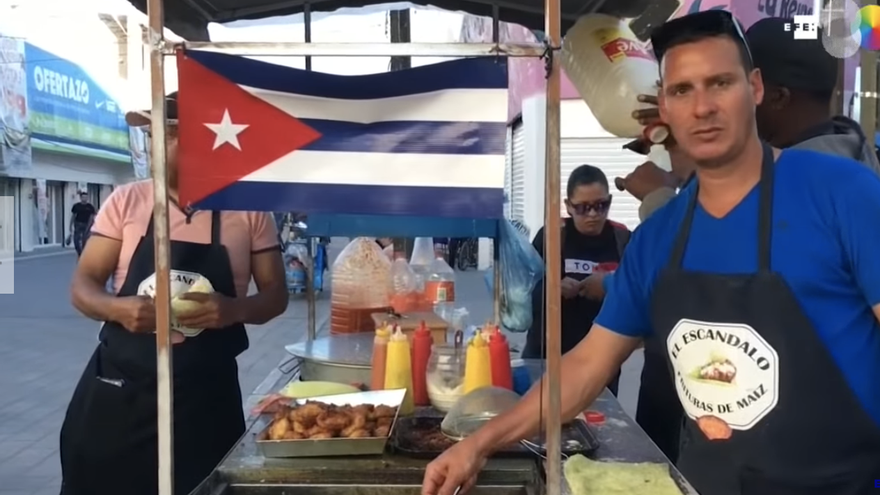
14ymedio, Lorey Saman, Mexico, 12 February 2021 — The announcement by Joe Biden’s administration to reopen the cases of asylum seekers who were sent back to Mexico, as of Feb. 19, has renewed hope for many Cubans who remain at the southern U.S. border in the expectation of being able to access an immigration court.
“In almost two years, it’s the only positive news we’ve had,” Luis Hechavarría, who is stuck in Ciudad Juárez, Chihuahua, tells 14ymedio. “In the Trump era all the news was negative; all the executive orders that came out were to make the process difficult for us and to leave us here in Mexico, but now a new path is opening up for us.”
Hechavarría does not stop harboring some doubts and recalls that there is a lot of desperation among Cubans since last January. “They have wanted to force their way to U.S. soil and that’s no good. Violating the national security of a country like the United States is a serious crime and I don’t want to add federal charges against myself.” continue reading
The U.S. Department of Homeland Security (DHS) announced Thursday that it will reopen asylum cases as part of a program “to restore the safe and orderly processing” of immigrants who remain at the southern border under the Migrant Protection Protocols (MPP) known as Permanezca en México, established through an agreement between Donald Trump and his Mexican counterpart, Andrés Manuel López Obrador.
The DHS estimates that some 25,000 people have active cases, as is the case with Hechavarría, who has only been able to attend court once. “I have known people who have had to attend up to four times, it is unfortunate and very stressful this situation.”
“Many of these people prefer not to show up at the border again so as not to be deported,” he says. Many like him cannot afford legal counsel, nor do they have sufficient knowledge to defend their cases. Hiring an immigration lawyer, he says, costs between $6,000 and $8,000 and “that service does not guarantee you a favorable resolution.”
Since the pandemic arrived in the United States, the courts have suspended their hearings on several occasions. “They haven’t worked for months and the new administration suspended them altogether.”
Faced with this panorama and the uncertainty of being deported to the Island, some Cubans along the border have decided not to appear before an immigration judge and have opted to apply for residency in Mexico, says the man, who is originally from Holguín (Cuba).
The violence and social insecurity on the Mexican side keeps Hechavarría on alert because of the large number of murders, but he admits that the people have been very welcoming to the Cubans. “We behave well and just work. If we were misbehaving there would be more deaths, but since I’ve been here I’ve only heard of two murders in our community.”
Hechavarria, who has been working in a restaurant for a year and a half, left Cuba for Guyana in 2018. “I have a daughter and I saw myself at 27 years old and with nothing in my hands, with no future to give her. In me, the pain of that last hug and that last kiss always remains,” he says. “But well, you know, one must be made of stone.”
Translated by: Hombre de Paz
____________
COLLABORATE WITH OUR WORK: The 14ymedio team is committed to practicing serious journalism that reflects Cuba’s reality in all its depth. Thank you for joining us on this long journey. We invite you to continue supporting us by becoming a member of 14ymedio now. Together we can continue transforming journalism in Cuba.
After a Two-Hour ‘Blackout’ in Cuba, Internet and Mobile Data Return
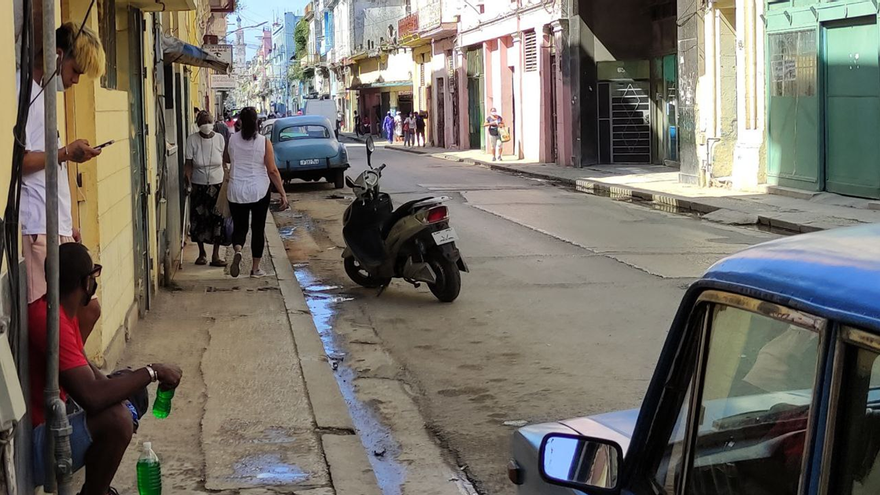
![]() 14ymedio, Madrid, 12 February 2021 — Cuba was cut off from the world for two hours by an internet blackout. Telephone communications were also affected in the capital and in all areas of the country.
14ymedio, Madrid, 12 February 2021 — Cuba was cut off from the world for two hours by an internet blackout. Telephone communications were also affected in the capital and in all areas of the country.
The 14ymedio correspondent in Spain lost contact with the Havana Newsroom shortly after 12 noon but was able to establish communication with a number in Cienfuegos, although it was very interrupted.
In addition, no official websites could be opened, from the Granma newspaper to the pages of the ministries, through all the provincial media, as well as social networks and messaging services.
“The internet went down in Cuba, I can’t communicate either by WhatsApp or by Telegram with anyone in my family,” said a Cuban resident in Ecuador. “It does not load Ecured or other .cu pages that I have tried to open from here, I even sent an SMS to my mother’s phone and the Ecuadorian operator has not confirmed that it reached her.” continue reading
“I have sent messages through various applications to my family without receiving responses for more than an hour,” confirmed another Cuban who lives in Spain.
The causes of the blackout are unknown, and, for now, the Cuban Telecommunications Company (Etecsa) has not reported any breakdown. “We had a technical interruption in voice and SMS services, as well as Internet access, they are restored. We apologize for the inconvenience caused,” the company limited itself to tweeting almost an hour after the internet returned.
It is known that, after two hours, the connection was still intermittent and that the problem extended to sending text messages (sms), calls between mobiles and communications abroad from landlines. “The number 118, for Services and Repairs of Etecsa, did not work either,” a woman in Havana tells this newspaper after the service was restored.
“On the 1 pm newscast, almost at the end of the broadcast, they gave brief information that there were technical problems with the internet connection,” says the same source. “They transmitted that information just after giving a very triumphant news report where it was stated how well the Transfermóvil service was working to pay for some services, from cell phones that have data.”
Among the services affected were also sales in stores in freely convertible currencies (MLC), due to not being able to access the network that checks cards in national and foreign currencies.
Internet outages are frequent on the island, as is the blocking of some pages, such as 14ymedio, which the Government finds ’uncomfortable’, and of some services such as Telegram. However, a network crash of this nature and extent is unprecedented.
Cuba, which for years was one of the most disconnected countries in the world, began in 2015 a gradual expansion of internet use, which until then remained forbidden to the majority of the population.
At the end of 2018, the mobile data service arrived, which has triggered access to the network in the country. According to a report from the Ministry of Communications, currently 7 million Cubans access the internet through different channels, 4.2 million of them through mobile data.
____________
COLLABORATE WITH OUR WORK: The 14ymedio team is committed to practicing serious journalism that reflects Cuba’s reality in all its depth. Thank you for joining us on this long journey. We invite you to continue supporting us by becoming a member of 14ymedio now. Together we can continue transforming journalism in Cuba.
Ceballos, One of the ‘Crown Jewels’ of the Cuban State, Registers Losses
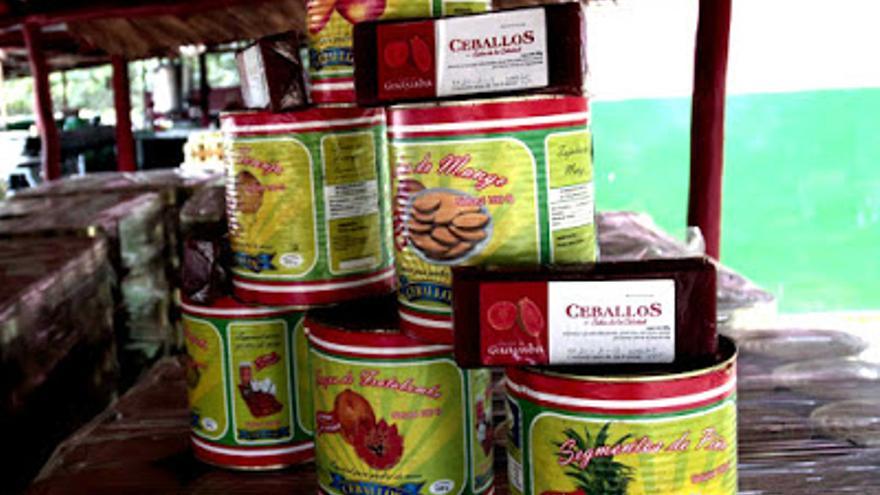
![]() 14ymedio, Havana, 12 February 2021 — The Ceballos Agroindustrial Company, from Ciego de Ávila, one of the few jewels in the crown of the Cuban State, ended the first month of 2021 in the red. It was not planned: as the official newspaper Invasor notes, Vice President Marino Murillo, architect of the “Ordering Task,” had insisted that Ceballos would not be among the 426 entities that could end up with losses this year.
14ymedio, Havana, 12 February 2021 — The Ceballos Agroindustrial Company, from Ciego de Ávila, one of the few jewels in the crown of the Cuban State, ended the first month of 2021 in the red. It was not planned: as the official newspaper Invasor notes, Vice President Marino Murillo, architect of the “Ordering Task,” had insisted that Ceballos would not be among the 426 entities that could end up with losses this year.
With the start of the new economic measures, the company went from the most demanded to the most reviled, when buyers observed that the prices of its products had quadrupled.
The entity did not put new products on sale until the third week of January due to lack of packaging, according to Invasor, but the rest of the month, no profits were generated, so the 5,000 workers of the company received only the basic salary. continue reading
Claudio Enrique Delgado Montes, director of Human Capital of Ceballos, told the local newspaper that with the salary reform of the Task Ordering, the salary increase was double, when the national average was 4.9, through having implemented piece-rate pay. “Therefore, our company’s increase wages must come hand in hand with profits, which is what is uncertain today.”
The problem, says the official newspaper without mincing words, “is precisely that the real cost of things conflicts with the express decision not to apply shock therapy and protect people’s purchasing power,” because “if it is important not to affect to the consumer, it is also important to maintain profitability.”
A reader responds to this in a comment: “Obviously, either the rules of the game change or the industry is bankrupt. If there is business autonomy, there can be no price limits against the logic of costs.”
Ceballos’ flagship products have been in high popular demand for years, especially its tomato sauces, canned sweets and other foods that are sold in various sizes of cans, including large ones. But, the opinions about the state company’s product line are not unanimous.
“I don’t buy their tomato puree because it is not good, they mix it with carrots and sometimes with beets to stretch it and the final flavor is not tasty. I think there is little left of the Ceballos industry of a few years ago, because the quality has fallen through the floor,” comments a customer, who frequently buys these canned foods through the market of the Youth Labor Army on Tulipán Street in Havana, speaking to this newspaper.
In the Cuban capital, the price of a can of tomato paste produced by the company has risen to more than 300 pesos, triple what the product cost last year before the monetary unification and price adjustments. Due to the new prices, the product is now piling up on store shelves without much demand.
The news of the the agro-industrial complex’s losses was published the same day that the governor Miguel Díaz-Canel insisted that “the business system of the Food Industry needs a shake-up, to take advantage of the 43 measures to strengthen the socialist state enterprise and get the most out of the ’Ordering Task’.”
“We can do more: more production, more efficiency, more products, better designs, different ranges of products, greater optimization of processes,” concluded Díaz-Canel at the meeting to analyze the work of the Ministry of the Food Industry during 2020.
____________
COLLABORATE WITH OUR WORK: The 14ymedio team is committed to practicing serious journalism that reflects Cuba’s reality in all its depth. Thank you for joining us on this long journey. We invite you to continue supporting us by becoming a member of 14ymedio now. Together we can continue transforming journalism in Cuba.
A Vacation in Cuba Without Leaving Your Room Can Cost Up To $600
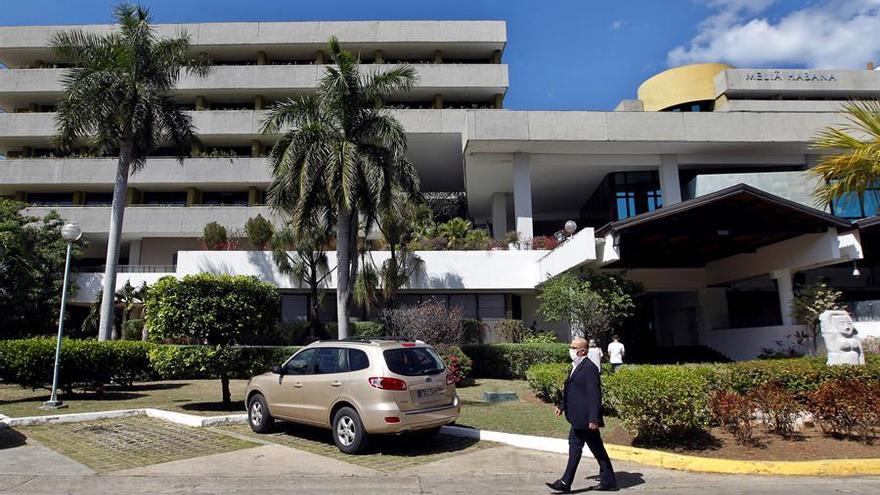
![]() EFE/14ymedio, Havana, 13 February 2021 — Enjoying five nights and six days in a hotel in Cuba is now more than ever within the reach of any international traveler, with packages ranging from 250 to 600 dollars. With one problem: the guest cannot leave the room.
EFE/14ymedio, Havana, 13 February 2021 — Enjoying five nights and six days in a hotel in Cuba is now more than ever within the reach of any international traveler, with packages ranging from 250 to 600 dollars. With one problem: the guest cannot leave the room.
These “confinement packages” include airport transfers and accommodation with full board in establishments of between three and five stars, in addition to medical attention and the number of PCR tests necessary so that the client can be released on the sixth day if the Covid-19 infection is ruled out. It is the island’s response to the collapse of tourism due to the pandemic.
Since the middle of last January, the island has suffered a harsh second wave of infections: it has not dropped below 500 daily positives and on some days it has touched a thousand. continue reading
Six hotels in Havana (Vedado, Parque Central, Capri, Tulipán, Meliá Habana and Comodoro), one in Varadero (Starfish Las Palmas) and six more in other provinces (Granjita and Los Caneyes in Santa Clara, Sol Cayo Coco in Ciego de Ávila, Plaza in Camagüey, Mirador de Mayabe in Holguín and Versalles in Santiago de Cuba) have hosted clients of various nationalities who have contracted this offer since last weekend.
To contain contagions, which in this second wave were attributed mainly to travelers from abroad, everyone who arrives in the country is obliged to undergo isolation until they have had rwo negative PCR tests at least five days apart.
There are two isolation options: the free one, which is to spend at least a week in state institutions in places such as campsites and student residences, and the paid one, with one of the new packages that can be purchased online at the traveler’s origin or directly at airport arrivals.
There are two isolation options: the free one, which is to spend at least a week in state institutions in places such as campsites and student residences, and the paid one, with one of the new packages that can be purchased online at origin or directly in the room of airport arrivals.
Cubans and residents on the island can choose between both options, but foreigners who arrive as tourists or for other purposes do not have the option of going to a state center and must spend the isolation period in a hotel.
“We are promoting it through social the networks so that the client comes with the purchased package,” declared the marketing director of the state agency Havanatur, Isabel Docampo, in a meeting with Efe and other international media in Havana to explain the new initiative.
So far, most of the hundreds of travelers who have purchased one of the “confinement packages” are Cubans residing in other countries, mainly in the United States, who return to visit their relatives, according to Docampo.
There are also Cubans who return from personal or work trips, as is the case of Madeline Hernández, who this week arrived from the Dominican Republic with her family and is staying at the four-star Comodoro hotel in Havana.
“I travel for work and my company pays for the package for us, so we don’t have to go to an isolation center, where the conditions are different,” this 49-year-old woman, who works for a foreign company , explains from the balcony of her bungalow in the Cuban capital.
Although Cubans currently occupy the vast majority of hotel rooms reserved for travelers in isolation, in Havanatur they believe that their offers could also be attractive to European, Asian or American tourists who want to escape the cold and the harsh restrictions imposed in their respective countries.
“The tourist who arrives and buys the package spends those five nights and six days in isolation and, if they are negative, they can continue making a tour around the country or continue doing the program they came to do here,” says the representative of Havanatur.
Some hotels, such as the Comodoro or the neighboring Meliá Habana (five stars), never closed due to the pandemic and now house travelers in isolation, so they have had to adapt part of their facilities to the strict hygiene and security that these types of guests require.
Marino Elorza, general director of Meliá Habana, explains the basic rules to avoid contagion: “Physical barriers, such as screens and gloves on workers, maximum observance of all processes set by Public Health and continuous communication with our team of doctors within of the hotel.”
These doctors visit each guest in isolation twice a day to check their health and take their temperature.
“I always tell customers: now here the boss in the hotel is the white coat, the doctors are, because the priority is that we all take care of ourselves,” says the director of this hotel, which reserves 90 rooms for travelers in isolation, currently 22 of which are occupied.
____________
COLLABORATE WITH OUR WORK: The 14ymedio team is committed to practicing serious journalism that reflects Cuba’s reality in all its depth. Thank you for joining us on this long journey. We invite you to continue supporting us by becoming a member of 14ymedio now. Together we can continue transforming journalism in Cuba.
Cuban Exiles and Opponents Ask Biden for Democratic Changes Without Concessions
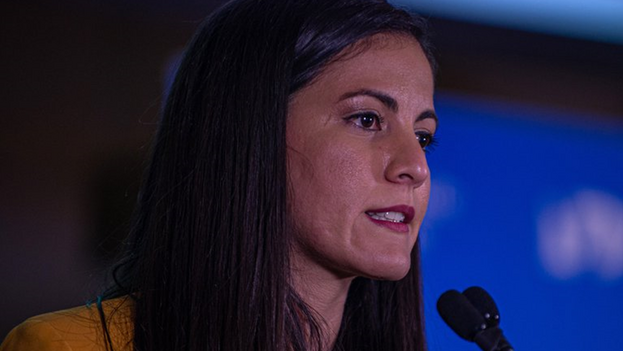
![]() EFE/14ymedio, Miami, 12 February 2021 — On Friday, Cuban exiles and opposition groups in Cuba urged United States president Joe Biden and the US Congress that the review of the policy towards Cuba should be based on democratic change without “unilateral concessions” to the government of President Miguel Díaz-Canel.
EFE/14ymedio, Miami, 12 February 2021 — On Friday, Cuban exiles and opposition groups in Cuba urged United States president Joe Biden and the US Congress that the review of the policy towards Cuba should be based on democratic change without “unilateral concessions” to the government of President Miguel Díaz-Canel.
For several weeks, Cubans “committed to democracy” drew up a plan with 162 proposals that they sent this Friday to the White House, the State Department, and Congress, according to Rosa María Payá, from Cuba Decides, speaking to Efe.
The activist also rejected “aggressive” requests made by the Cuban government and other actors on the Island to the new US Administration of Democrat Biden. continue reading
Payá expressly rejected the removal of sanctions against the financial corporation Fincimex, linked to the Armed Forces
Among them the recent one by a group of Cubans and Americans, such as Alan Gross, who asked Biden to resume the rapprochement with Cuba promoted by President Barack Obama (2009-2017) and to withdraw the sanctions on Cuba toughened by his successor, Republican Donald Trump.
Gross was released in 2014 after five years in prison in Cuba for bringing telecommunications equipment into the country.
Payá expressly rejected the removal of sanctions against the financial corporation Fincimex, which is linked to Cuba’s Armed Forces and handles remittances received from the United States.
She added that they are in favor of “direct” remittances, without the intervention of the Cuban government.
Payá stressed that “it is only up to Cubans to define and decide the destiny of our nation.”
For Cubans who contributed ideas, among them the Ladies in White, the Cuban Republican Party and many other civil groups, the new policy towards Cuba “must be in support of democracy and free and plural elections, without making unilateral concessions, but conditional on irreversible steps towards the recognition of human rights.”
With Biden’s arrival at the White House, politicians and groups of Cuban exiles have asked him not to repeat the mistakes made by the last two administrations, including that of President Obama, which promoted rapprochement with Cuba and in whose administration Biden served as Vice-President.
With Biden’s arrival at the White House, politicians and groups of Cuban exiles have asked him not to repeat the mistakes made by the last two administrations
The proposals were published this Friday by the Pasos de Cambio [Steps of Change] platform, which include the impressions of Cuban opposition organizations and civil society, as well as citizens living on the Island and in the diaspora.
They all agree that “any eventual negotiation process involving the current Cuban regime must recognize the members of the opposition and civil society as interlocutors.”
They point out that, to this end, the regime must first comply with the unconditional release of all political prisoners in Cuba and end all violence and repression.
Similarly, organizations such as the National Human Rights Foundation and the Opposition Movement for a New Republic, urge respect for fundamental human rights, including freedom of expression, association and public demonstration.
To this end, they asked the Biden Administration to “publicly express the will to authorize and promote humanitarian aid from the American people to Cuban citizens and its civil society, preventing the intervention of or benefit to the regime.”
They asked the Biden Administration to “publicly express the will to authorize and promote humanitarian aid from the American people to Cuban citizens and its civil society
They also insisted on political, financial, diplomatic and judicial sanctions against collaborators and those responsible for repression and for policies of human rights violations.
They suggested considering the use of the Global Magnitsky Law on Human Rights Responsibility, aimed at imposing political and economic sanctions against agents involved in serious abuses.
The proposals include calling on the international community, including the countries in the Americas and multinational organizations (OAS, UN, European Union), to show their solidarity with the Cuban people and “their right to decide democratic change.”
On the other hand, State Department spokesman, Ned Price, said this Friday at a press conference that the US Government’s policy towards Cuba will be guided by respect for human rights and the empowerment of the Cuban people “so that they can determine their future.”
Price reiterated the Biden Administration position by emphasizing that “Americans, and especially Cuban-Americans are the best ambassadors of freedom and prosperity in Cuba.”
Translated by Norma Whiting
____________
COLLABORATE WITH OUR WORK: The 14ymedio team is committed to practicing serious journalism that reflects Cuba’s reality in all its depth. Thank you for joining us on this long journey. We invite you to continue supporting us by becoming a member of 14ymedio now. Together we can continue transforming journalism in Cuba.
